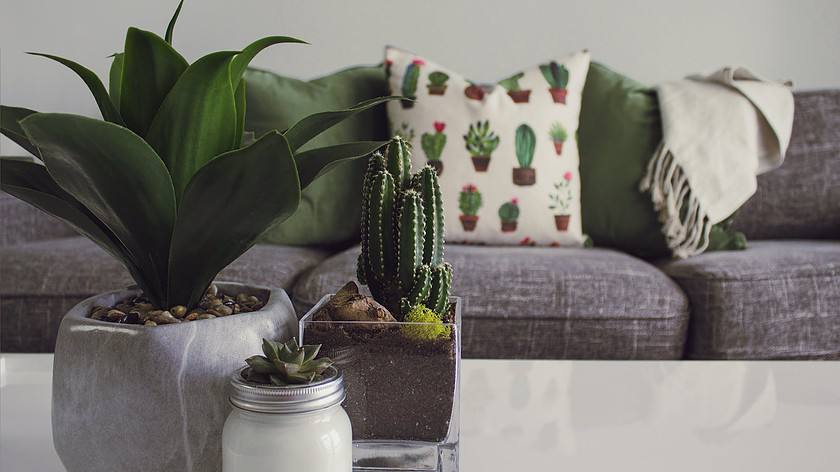Have you ever noticed how a breath of fresh air can instantly uplift your mood and clarity of mind? Imagine bringing that rejuvenating essence indoors, where we spend the majority of our time.
According to recent studies, indoor air quality can be up to five times more polluted than outdoor air, contributing to a host of health issues ranging from respiratory problems to reduced cognitive function. But guess what? There’s a simple fix that does wonders not just for our air but for our mental well-being too: indoor plants.
Apart from their visual charm, having house plants can provide a wealth of advantages that positively impact our overall health. In this post, we’ll explore the importance of indoor plants for air quality and mental wellness, along with practical tips for incorporating them into your living space.
Here are 7 Ways Indoor Plants Transform Your Home into a Holistic Oasis.

1. The Healing Power of Nature
- You know that feeling when you step outside and take a deep breath of fresh air, and suddenly everything just feels better? Well, it turns out you can bring that same sense of peace and connection indoors with some leafy companions. Indoor plants aren’t just pretty decor – they’re like little slices of nature that can make a big difference in how we feel.
- Indoor plants can promote calmness and relaxation through various mechanisms, including their ability to purify the air. Studies have shown that simply being in the presence of plants can reduce stress, anxiety, and feelings of fatigue. So when life gets hectic, consider welcoming a lovely little pot of green into your home. They might just be the serene touch you need to unwind and find your peace, right where you are.
2. Improving Air Quality
- Indoor air quality can often be more polluted than outdoor air due to factors such as off-gassing from furniture and electronics, as well as inadequate ventilation. Indoor plants act as natural air purifiers, absorbing harmful pollutants such as benzene, formaldehyde, and trichloroethylene, and releasing oxygen into the air. By incorporating plants into your home, you can significantly improve the quality of the air you breathe.
3. Boosting Mental Wellness
- In addition to improving air quality, indoor plants have been shown to have positive effects on mental health. The presence of greenery indoors has been linked to reduced symptoms of depression and anxiety, increased feelings of happiness and relaxation, and improved cognitive function.
Taking care of plants can also foster a sense of purpose and accomplishment, boosting self-esteem and overall well-being. Engaging with plants allows us to slow down, practice patience, and appreciate the beauty of growth and renewal, all of which contribute to our mental, emotional, and spiritual well-being. So, beyond just beautifying our living spaces, indoor plants play a vital role in supporting our holistic health by nurturing both our physical environment and inner selves.
4. Choosing the Right Indoor Plants
- When selecting plants for your home, consider factors such as light levels, humidity, and maintenance requirements. Some plants, such as snake plants and pothos, thrive in low-light conditions and require minimal care, making them ideal for beginners. Others, like ferns and orchids, prefer higher humidity levels and may require more attention. Research the specific needs of each plant to ensure success.
5. Creating a Green Oasis
- Transforming your home into a green oasis doesn’t require a large amount of space or investment. Start by placing a few plants in key areas, such as the living room, bedroom, or kitchen, where you spend the most time. Consider incorporating a variety of plant types and sizes to add visual interest and depth to your space. Don’t forget to choose decorative pots or planters that complement your decor style.
6. Caring for Your Plants
- Proper care and maintenance are essential for keeping your indoor plants thriving. Pay attention to watering needs, ensuring that plants are neither overwatered nor underwatered. Monitor light levels and adjust plant placement accordingly to prevent issues such as yellowing leaves or leggy growth. Regularly dust leaves, prune as needed, and repot plants when they outgrow their containers.
- As a form of mindfulness practice, caring for plants encourages us to be present in the moment, reducing rumination and promoting mental clarity. In essence, tending to plants not only nurtures greenery but also nurtures our minds, offering a simple yet effective way to improve mental health and well-being.
7. Growing with Greenery
- Bringing indoor plants into your home is not just about improving air quality or enhancing decor; it’s about cultivating a deeper connection with nature and nurturing your own well-being. Embrace the journey of plant parenthood, learning and growing alongside your green companions. Celebrate each new leaf, bloom, and milestone, and take joy in the simple yet profound presence of nature in your daily life.
Indoor plants have the remarkable ability to improve air quality, boost mental wellness, and enhance the overall quality of our living spaces. By incorporating plants into your home and caring for them with intention and mindfulness, you create a holistic sanctuary in your home that nourishes your body, mind, and spirit.
Let the beauty and vitality of indoor plants inspire you to grow a deeper connection with nature and create a sense of peace and well-being within your home.





